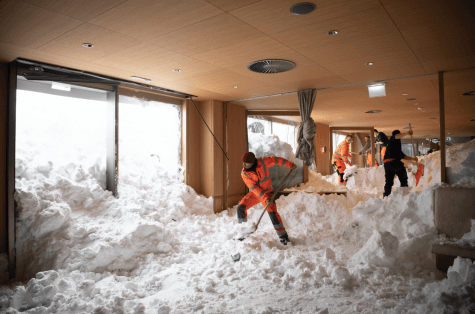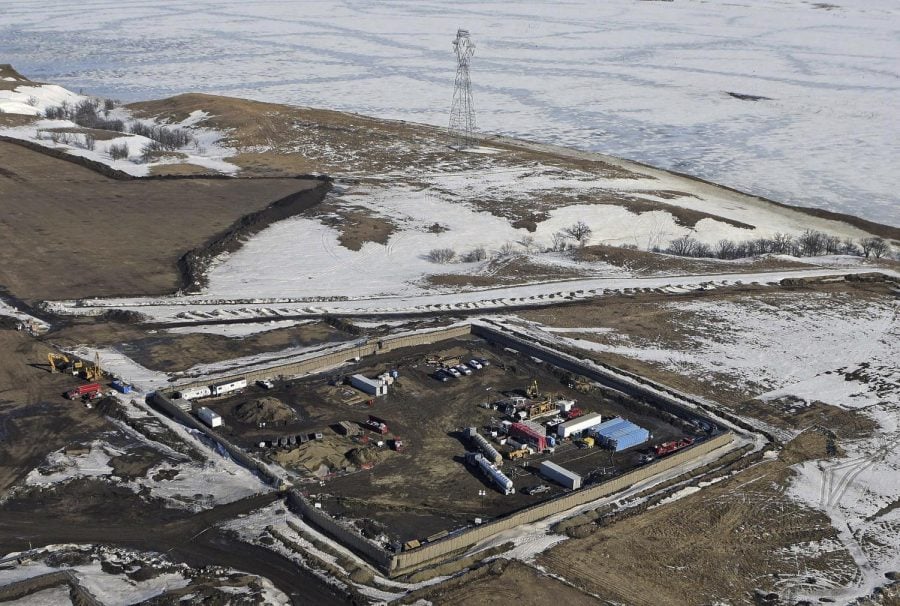Nation and World Briefs
Credit: Tom Stromme | AP/The DePaulia
Regulators: Dakota Access company complied with settlement
BISMARCK, N.D. (AP) — The developer of the Dakota Access oil pipeline has planted tens of thousands of trees and taken other steps to settle allegations that it violated North Dakota rules during construction, state regulators have concluded.
The September 2017 agreement between Texas-based Energy Transfer Partners and North Dakota’s Public Service Commission settled allegations that ETP removed too many trees and that it improperly handled a pipeline route change after discovering Native American artifacts. The artifacts were not disturbed.
The company denied intentionally doing anything wrong but could have faced fines of up to $200,000. Instead, it was required to plant a certain number of new trees and develop an industry handbook and conduct training on properly handling pipeline route adjustments.
The company last spring filed a nearly 80-page industry handbook it developed, and in October it filed documents detailing efforts by a contractor to plant 141,000 trees and shrubs over two years. The PSC in late November asked for more proof that ETP had complied with all conditions of the settlement.
The company filed numerous documents later that month and in December, including a letter in which attorney Lawrence Bender said he was “disappointed” that compliance had been questioned.
Public Service Commissioner Julie Fedorchak said the three-member group discussed the matter at a Wednesday meeting and concluded the company was in compliance.
ETP missed a year-end deadline to plant about 11,000 of a required 20,000 trees through soil conservation districts in counties along the pipeline route. A provision in the settlement agreement allows the company to extend the work into this year if there are problems with the tree supply “or other market conditions.”
Avalanches, accidents bring Europe’s winter death toll to 21

BELGRADE, Serbia (AP) — Heavy snow paralyzed much of Europe for yet another day, cutting off mountain villages, sparking avalanches like one that crashed into a Swiss hotel and killing at least four more people Friday.
Workers at the Hotel Saentis in eastern Switzerland spent Friday shoveling out hip-deep snow after a 300-meter (330-yard) wide avalanche smashed through the hotel’s windows Thursday afternoon and piled up in rooms and the dining hall. Police said three people were hurt by avalanche in Schwaegalp.
In all, at least 21 weather-related deaths have been reported in Europe in the last 10 days.
The Bulgarian Red Cross said two snowboarders were killed died in an avalanche in southwest Bulgaria’s Pirin Mountains.
A snowplow driver died Friday in Germany after his vehicle toppled into an icy river, while an electrical worker in Albania suffered a fatal heart attack while repairing damaged power lines.
Austrian military helicopters on Friday flew 66 German teenagers out of a mountain guest house where they had been stuck for several days.
About 2,000 soldiers and other emergency workers in Albania were assigned to help people trapped by snow and to clear roads to restore access to cutoff villages.
Several towns and cities in southwest Serbia introduced emergency measures, warning of snow piling up on the roads and sealing off mountain villages, Serbian state TV reported Friday. Most schools in the area closed down and 10 people had to be rescued from their homes. Strong winds complicated the work of emergency crews.
In neighboring Montenegro, meteorologist Dragan Buric said the first 10 days of January have been among the coldest the country has seen in decades.
“We have snow in January in the capital city (Podgorica) for the first time in nine years,” Buric told Montenegrin state TV.
In the central Bosnian municipality of Kladanj, snow disrupted power supplies and cut phone lines. Zijad Vejzovic, from the civil protection agency, said authorities declared an emergency.
“Because of heavy snow, in some parts over 1 meter (3 feet) high, some of the roads have been blocked,” he explained. “We need more machines. We have run out of resources and money.”
In Germany and Austria, where heavy snow caused fatal avalanches and major disruptions in the past few days, the situation was easing Friday. Still, airlines canceled around 120 flights at Frankfurt Airport and 90 at Munich Airport because of concerns about snow.
Police in Lenggries, south of Munich, said the 48-year-old snowplow driver was rescued from the river after several hours but died in a hospital.
In the eastern German city of Chemnitz, all burials at the municipal cemetery through Monday were called off because of snow.
In the elegant Austrian city of Salzburg, all parks, public gardens, play areas and cemeteries were closed Friday because of the danger posed by trees cracking under the weight of snow.
Woman who fled Saudi Arabia reaches her new home

TORONTO (AP) — Tired but smiling, an 18-year-old Saudi woman who said she feared death if deported back home arrived Saturday in Canada, which offered her asylum in a case that attracted global attention after she mounted a social media campaign.
“This is Rahaf Alqunun, a very brave new Canadian,” Foreign Minister Chrystia Freeland said arm-in-arm with the Saudi woman in Toronto’s airport.
Rahaf Mohammed Alqunun smiled broadly as she exited an airport arrival door sporting a Canada zipper hoodie and a U.N. High Commissioner for Refugees hat, capping a dramatic week that saw her flee her family while visiting Kuwait and before flying to Bangkok. Once there, she barricaded herself in an airport hotel to avoid deportation and tweeted about her situation.
On Friday, Prime Minister Justin Trudeau announced that Canada would accept Alqunun as a refugee. Her situation has highlighted the cause of women’s rights in Saudi Arabia, where several women fleeing abuse by their families have been caught trying to seek asylum abroad in recent years and returned home.
Freeland said Alqunun preferred not to take questions Saturday.
“She is obviously very tired after a long journey and she preferred to go and get settled,” Freeland said. “But it was Rahaf’s choice to come out and say hello to Canadians. She wanted Canadians to see that she’s here, that she’s well and that she’s very happy to be in her new home.”
After arriving she was off to get winter clothes, said Mario Calla, executive director of COSTI Immigrant Services, which is helping her settle in temporary housing and applying for a health card.
Calla said Alqunun has friends in Toronto who she would be meeting up with this weekend.
“She did comment to me about the cold,” Freeland said.







